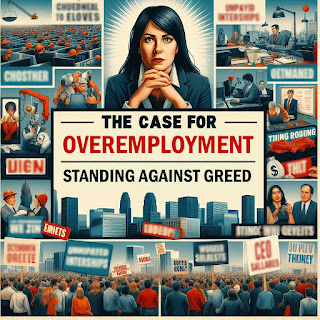The Case for Overemployment: Standing Against Corporate Greed
Unfortunately, the goal of profit frequently comes at the expense of employee well-being in the current corporate environment that focuses on greed instead of quality of life or perhaps "good profit"[1]. When companies focus on cost-cutting strategies like outsourcing and layoffs, workers are put in vulnerable positions and must deal with dwindling prospects for career advancement. As a result, some people are taking matters into their own hands and adopting the idea of "overemployment"[2], in which they work more than one full-time job without telling their employers.
The motivation behind overemployment stems from a desire to insulate oneself from the volatile nature of corporate decision-making. Despite healthy earnings, many organizations continue to enact reductions in force, leaving employees vulnerable to sudden job loss. By being overemployed, individuals create a safety net for themselves, ensuring that they can maintain their quality of life even if one of their jobs is eliminated.
Moreover, the allure of cheap labor and perception of quality in the form of offshore resources has led to a devaluation of seasoned IT professionals with tangible and undeniable superior value. Instead of leveraging their expertise, these professionals are often relegated to vendor management roles, missing out on opportunities to contribute meaningfully to their organization's initiatives. Overemployment allows these individuals to reclaim and maintain their value by actively engaging in work that utilizes their skills and experience.
However, the concept of overemployment is not without its challenges. Balancing multiple full-time jobs can lead to burnout and a decline in overall well-being. Additionally, the practice raises ethical questions about honesty and transparency in the workplace. Employers rely on the trust and dedication of their employees, and overemployment can erode that trust.
The rise of overemployment reflects a broader discontent with corporate practices that prioritize profit over people. While it may provide a sense of security and empowerment to individuals, it also demands that organizations reevaluate their approach to talent management. By recognizing and valuing the skills and experience of their employees, organizations can create a more equitable and sustainable workplace for all.
Loyalty Lost: The Ethics of Overemployment in Corporate Realities
Corporate practices such as taking government bailout money for share buybacks and cutting ties with loyal employees, the argument that overemployment raises ethical questions about honesty and transparency in the workplace can certainly be challenged given behaviors on the other side.
When organizations prioritize executive bonuses and shareholder returns over employee well-being, they undermine the trust and dedication that employees have for the company. Employees who have dedicated their time and expertise to the organization, often at the expense of their families, are left feeling betrayed when their loyalty is not reciprocated.
Furthermore, trusting executives who are disconnected from frontline operations can be seen as a risky proposition. These executives prioritize short-term gains over long-term sustainability, leading to decisions that benefit shareholders and executives at the expense of employees and the company's overall health.
In this context, overemployment can be seen as a necessary means of self-preservation for employees who have been let down by corporate greed. By taking on multiple jobs, individuals are taking control of their own financial security and quality of life, rather than relying on the promises of executives whose interests do not align with their own.
While overemployment may raise ethical questions in a traditional sense, in a corporate environment marked by greed and disregard for employee well-being, it can be seen as a justified response to ensure one's own financial stability and protect against the whims of untrustworthy executives.
Project Exclusion: The Marginalization of Experienced Employees
Imagine a situation where a long-term employee with a proven track record of performance has been told their services are no longer required. The employee despite glowing performance annual reviews has been excluded from new projects, especially ones driven by unrealistic deadlines and managed by incompetent or politically motivated managerial types. The heavy involvement of a vendor's professional services arm further compounds the issue, as it not only undermines the expertise and capabilities of the internal individuals but also creates a dependency on external resources that may not have a long-term investment in the success of the project or the organization.
Moreover, the short-sighted focus on project delivery timelines, at the expense of quality and long-term sustainability, leads to additional challenges down the line. When management grows tired of paying for high-priced vendor resources and the project is handed over to internal teams, those employees who were excluded from the project's development may find themselves ill-equipped to maintain and support it effectively. This not only reflects poorly on the organization's leadership and decision-making but also puts undue pressure on the internal team to rectify issues and deliver results without the necessary support or engagement.
In such a scenario, it is essential for organizations to recognize the value of their long-term employees and involve them in projects that align with their expertise and experience. Additionally, a more balanced approach to project management, focusing on both short-term deliverables and long-term sustainability, can help mitigate the risks associated with over-reliance on external resources and inexperienced management.
Beyond the 9-to-5: Overemployment in the Age of Corporate Greed
The concept of overemployment reflects a broader societal shift in response to corporate practices that prioritize profit over people. While it may raise ethical questions about honesty and transparency in the workplace, particularly in light of corporate greed and executive decisions that prioritize shareholder returns over employee well-being, it also serves as a means of empowerment for individuals seeking to take control of their financial security and quality of life.
As organizations continue to navigate the complexities of a rapidly changing economy, it is essential for them to reevaluate their approach to talent management and prioritize the well-being and value of their employees. By fostering a culture of trust, transparency, and mutual respect, organizations can create a more equitable and sustainable workplace for all, where employees are valued for their skills and dedication, rather than seen as disposable assets.
Ultimately, the rise of overemployment underscores the need for a fundamental shift in corporate values, where employees are viewed not just as a means to an end, but as essential partners in the success and longevity of the organization. By embracing this shift, organizations can build stronger, more resilient teams that are better equipped to face the challenges of an ever-evolving business landscape.
- Good Profit: Charles Koch of Koch Industries mentions in his book 'Good Profit' that "Good profit results from products and services that customers vote for freely with their dollars, products that improve people's lives. It results from a culture where employees are empowered to act entrepreneurially to discover customers' preferences and the best ways to satisfy them. Good profit is what follows when long-term value is created for customers, employees, shareholders, and society."
- Overemployment: "Overemployment" refers to a situation where an individual holds multiple full-time, typically salaried positions without the knowledge or approval of their employers.








Comments
Post a Comment